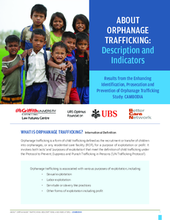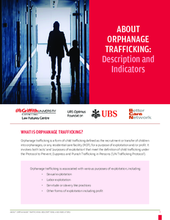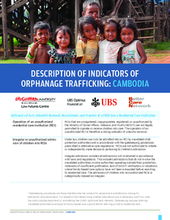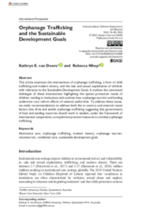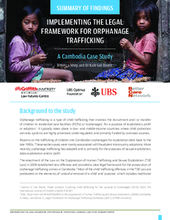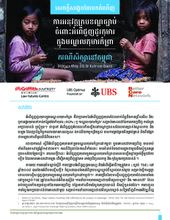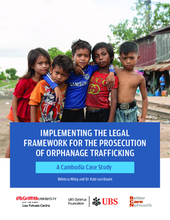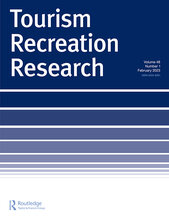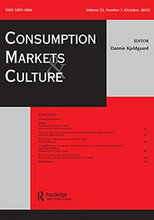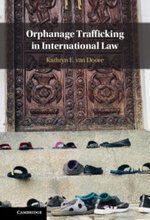<< Back to ReThink Orphanages Home

Resources for Divestment
 Orphanage Divestment Resource
Orphanage Divestment Resource
Orphanage divestment resources for the travel and volunteering sectors
 Divesting of Residential Care Services: Guidelines for Donors
Divesting of Residential Care Services: Guidelines for Donors
These guidelines have been written to guide donors and partners through the process of gathering information, making the decision to divest, securing buy-in internally for divestment, engaging with your partner and other stakeholders, developing your divestment plan, communicating your plan, and addressing any child safety concerns.
Resources for Schools and University Groups
The following resources have been developed by members of the ReThink Orphanages coalition in order to support schools and universities to strengthen their work around overseas student volunteering and travel.
Australia
![]() Curriculum resource - aimed at 15 - 18 year olds, have been designed to support educators in teaching about the complex issue of institutionalisation and orphanage tourism in the classroom.
Curriculum resource - aimed at 15 - 18 year olds, have been designed to support educators in teaching about the complex issue of institutionalisation and orphanage tourism in the classroom.
![]() Self Assessment Tool - Developed by our partner organisations in Australia - Save the Children Australia, World Challenge and ALTO - this self assessment tool has been designed to help schools and universities undertake their own due diligence on their service learning, volunteering and community engagement activities overseas. The tool will help with risk assessment and management of overseas trips and is user friendly, with clear guidance and best practice examples.
Self Assessment Tool - Developed by our partner organisations in Australia - Save the Children Australia, World Challenge and ALTO - this self assessment tool has been designed to help schools and universities undertake their own due diligence on their service learning, volunteering and community engagement activities overseas. The tool will help with risk assessment and management of overseas trips and is user friendly, with clear guidance and best practice examples.
USA
Teaching resources - designed by and for US educators to navigate the complexities of ethical global volunteer practices, including engagement with orphanages and residential care institutions. These resources provide a way to introduce students to: ethical and responsible community engagement and issues of orphanage tourism and voluntourism. The resources are aimed for high school students and can be modified for middle school:
![]() Designing an ethical global service learning program
Designing an ethical global service learning program
Unpacking global poverty through service learning
UK
![]() England curriculum resource - these resources have been developed to support English schools to navigate the complexities of engagement with orphanages and residential care institutions overseas as part of a Gap Year project or an overseas expedition. They are designed to provide an overview of the issues of orphans and vulnerable children, orphanage tourism and ‘voluntourism’, and ethical and responsible community engagement. The resources are aimed at KS4 and KS5 and have been designed to align with the English curriculum - specifically the SMSC and PSHE criteria.
England curriculum resource - these resources have been developed to support English schools to navigate the complexities of engagement with orphanages and residential care institutions overseas as part of a Gap Year project or an overseas expedition. They are designed to provide an overview of the issues of orphans and vulnerable children, orphanage tourism and ‘voluntourism’, and ethical and responsible community engagement. The resources are aimed at KS4 and KS5 and have been designed to align with the English curriculum - specifically the SMSC and PSHE criteria.
The University Pledge
Several universities in Europe have pledged not to support orphanage volunteering by committing to not allow the promotion of such opportunities to their students.
If your school, college or university currently supports an orphanage overseas we can help to review this to ensure that efforts are directed towards programs that will help families stay together.
Resources for Gap Year and Study Abroad Students
Learning Through Volunteering
![]() Our friends over at Learning Service have written a brilliant book called Learning Service: The Essential Guide to Volunteering Abroad, which we would highly recommend you read should you be considering participating in a voluntary experience whilst studying abroad. They also give some fantastic advice on how to increase your learning whilst travelling.
Our friends over at Learning Service have written a brilliant book called Learning Service: The Essential Guide to Volunteering Abroad, which we would highly recommend you read should you be considering participating in a voluntary experience whilst studying abroad. They also give some fantastic advice on how to increase your learning whilst travelling.
Resources for Churches and Short-Term Mission Teams
![]() If you’re planning a short-term mission trip you’re in luck! Our faith-based partner organisations have developed some excellent guidance documents and resources to support you in understanding how to avoid any potential harm and instead ensure positive outcomes for vulnerable children, their families and their communities.
If you’re planning a short-term mission trip you’re in luck! Our faith-based partner organisations have developed some excellent guidance documents and resources to support you in understanding how to avoid any potential harm and instead ensure positive outcomes for vulnerable children, their families and their communities.
Australia
USA
- Christian Alliance for Orphans (CAFO)
- Catholic Relief Services (CRS)
- Faith to Action
- SOE (Standards of Excellence in Short-term Mission)
UK
How Can I Help Bring an End to Short-Term Mission Trips to Orphanages?
Short-term mission trips to orphanages are an established component within the global church’s understanding of their responsibility to vulnerable children. It is definitely not easy to change this practice, but it is possible! Below we’ve put some practical suggestions for ways that short-term missions can be redirected towards programs helping to keep families together.
1. Raise Awareness
Reading this webpage, you may be thinking how have you never heard of this issue before. Although gaining traction within the global church community, this is still far from being common knowledge and so everybody has a responsibility to talk to others and encourage them to think about their role and the role of their church in doing what’s in the best interests of children worldwide. Share what you’ve read here today about the harms associated with short-term mission trips to orphanages with your church leadership and congregation members.
2. Change Policy
Advocate for policy to be created and implemented at your church which prevents short-term mission teams or individuals from volunteering in or visiting orphanages.
3. Examine Your Partnerships
Do you have current partners who encourage short-term mission trips to orphanages that you could arrange to speak to about this issue? Could you choose partners in future based on their commitment to not run these types of trips?
4. Short-Term Mission Preparation
Include a session on the harms of orphanage volunteering and visits in your pre-trip training in order to raise awareness amongst team members before you depart.
Campaigns
 The Love You Give Campaign
The Love You Give Campaign
This campaign has been developed by the Better Care Network, with support from its partner organisations working through the ReThink Orphanages coalition. The cross-sectoral coalition is working to end the popular practice of orphanage volunteering and channel efforts towards programmes designed to prevent family separation.
Volunteering Standards
- The Global Volunteering Standard
- The Code
- Child Safe Movement: Be A Child Safe Volunteer
- Child Welfare and the Travel Industry: Global Good Practice Guidelines
<< Back to ReThink Orphanages Home
See More Resources on Orphanage Tourism, Voluntourism and Trafficking:
Displaying 21 - 30 of 147
Results from the Enhancing Identification, Prosecution and Prevention of Orphanage Trafficking Study in Cambodia.
This document provides clear definitions of what orphanage trafficking is and how to detect this kind of exploitation.
This is a list of indicators of acts: Unlawful Removal, Recruitment, and Transfer of a Child into a Residential Care Institution
This article examines the intersections of orphanage trafficking, a form of child trafficking and modern slavery, and the sale and sexual exploitation of children with reference to the Sustainable Development Goals. It outlines the contextual challenges of these intersections highlighting the special protection needs of children residing in institutions and outlines how orphanage tourism and funding undermine care reform efforts of national authorities.
This study was conducted as a part of a multi-stage, multi-country project designed to enhance the identification, prosecution, and prevention of orphanage trafficking crimes. It was the second of four stages to be conducted in Cambodia as one of three jurisdictions included in the study. This report contains a summary of findings from this stage two case data and case study analysis.
ការសិកសាស្រវជ្រវនះត្រូវធ្វើឡើងជាផ្នកមួយនគម្រងស្រវជ្រវពហុប្រទស ដលមានច្រើន ដំណាក់កាល ដលត្រូវបានរចនាឡើង ដើមបីពង្រឹងការកំណត់អត្តសញ្ញណ ការផ្ដន្ទទោស និងការទប់ស្កត់ បទល្មើសជួញដូរកុមារក្នុងមណ្ឌលកុមារកំព្រ។ការសិកសាស្រវជ្រវនះគឺជាដំណាក់កាលទីពីរនដំណាក់កាល ទាំ
This study was conducted as a part of a multi-stage, multi-country project designed to enhance the identification, prosecution, and prevention of orphanage trafficking crimes. It was the second of four stages to be conducted in Cambodia as one of three jurisdictions included in the study.
This global study examined 106,979 tweets posted by 34,370 unique users from 2010 to 2019 to understand the sentiment of those indirectly involved in orphanage tourism and its change over time.
This paper examines the understanding of poverty emerging in voluntourists’ accounts of their first-hand experiences of poverty alleviation. Based on the ethnography of an orphanage in Nepal, the authors show that despite voluntourists’ good intentions and even (self-)criticism of the volunteer tourism approach to poverty relief, their accounts tend to consolidate rather regressive ideas about poverty.
This book explores the process of orphanage trafficking as a form of child trafficking in international law, examining the contexts in which it occurs and providing a comprehensive, holistic approach to addressing the issue as a form of trafficking

